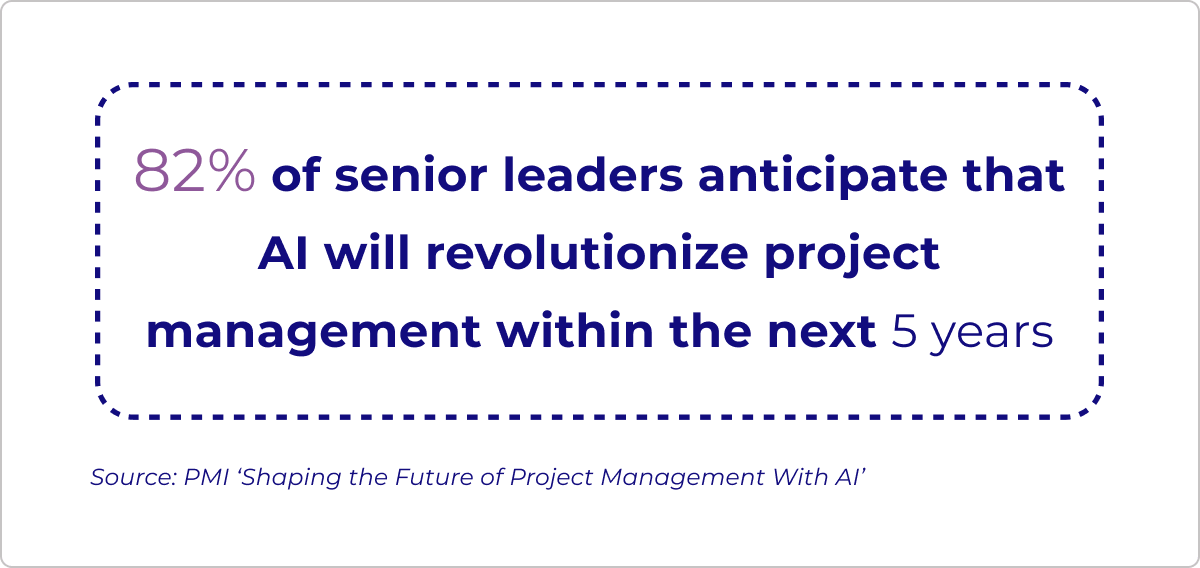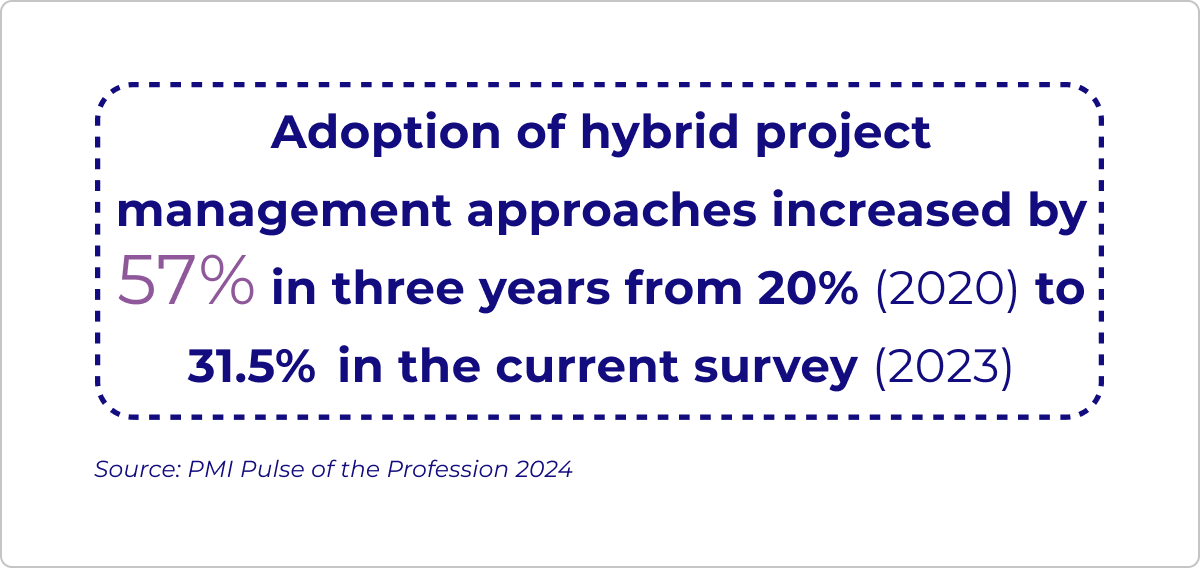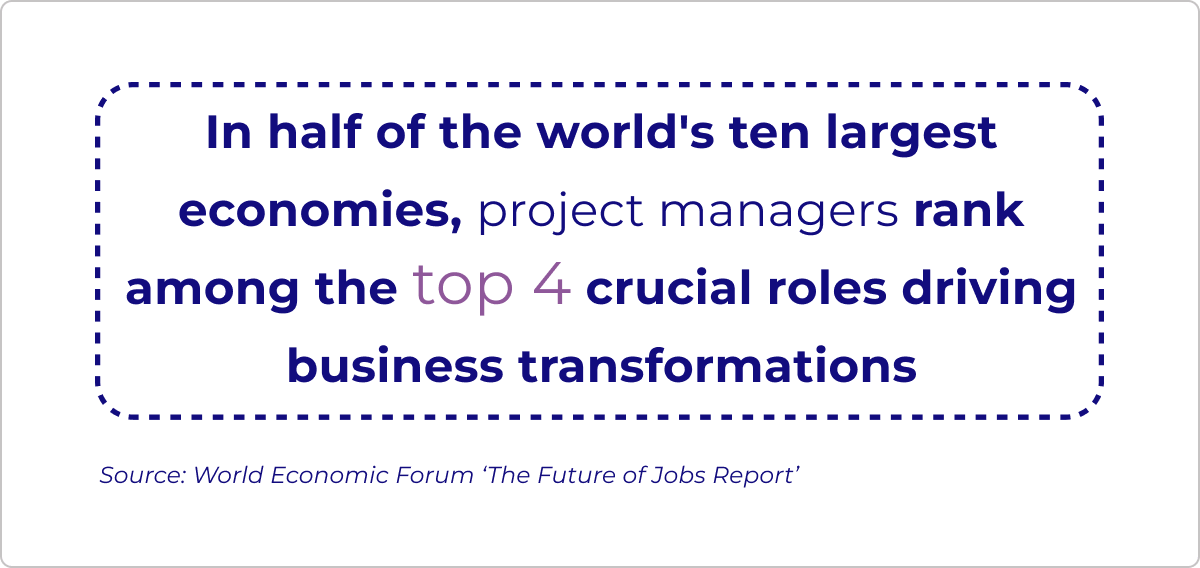The project management field is experiencing a dynamic evolution driven by the surge of artificial intelligence (AI) and the rise of hybrid project delivery models. Looking ahead, it's clear that project managers must master the latest technologies and the soft skills crucial for leading and uniting teams. Today, effective project management transcends the basics of task completion and data analysis; it involves keen, active listening, adaptive leadership, and a deep understanding of team dynamics.
In this article, we'll explore the cutting-edge trends redefining project management, identify the essential skills for success in this changing landscape, and examine how automation is revolutionizing the industry.
How Is AI Shaping Project Management Trends?
AI is already impacting a range of tasks across various industries, with applications extending to many fields, including project management.
1. 82% of senior leaders anticipate that AI will revolutionize project management within their organizations within the next five years.
Approximately 21% already leverage generative artificial intelligence (GenAI) for project management. Rapid technological advancements are transforming how projects are delivered. Smart CRM, ERP, and project management systems are increasingly being enhanced with advanced features for task automation, planning, reporting, and more.

2. 74% of chief economists predict that generative AI will drive breakthrough innovations in high-income countries.
This insight is further supported by the nearly unanimous belief (94%) among these economists that high-income economies will experience a significant boost in productivity over the next five years (79%). In contrast, only 53% expect similar productivity gains in developing countries.
3. Over 50% of employees see generative AI skills as essential for their roles, yet only 13% have received AI training in the past year.
At the same time, one-third of employees are already leveraging AI to manage their operations. This trend is solid in India, where over half (56%) report using AI in their roles, followed by Australia (32%) and the US (29%). Furthermore, AI training ranks among employees' top three most desired professional development opportunities, revealing a significant opportunity for organizations to enhance their training programs.
4. Looking beyond 2024, AI is poised to create significant project opportunities.
A PMI survey on project management jobs highlights this trend, particularly for project professionals skilled in agile methodologies. Being well-versed in emerging technologies will position them at the forefront of their field and enable them to lead AI adoption initiatives within their organizations, driving innovation and strategic advantage.
Hybrid Project Management: The New Norm
As organizations increasingly prioritize agility and resilience, project management methods are evolving to become more flexible and inclusive. This shift is paving the way for hybrid approaches that integrate various management techniques, offering a comprehensive way to deliver value.
According to the PMI's 15th annual Pulse of the Profession report, which focuses on the adoption and evolution of project management approaches:
5. Hybrid project management is quickly becoming the preferred choice for its tailored approach, with adoption surging by 57% over the past three years.

6. In a shift towards more dynamic methodologies, 34% of organizations anticipate a decrease in traditional predictive methods over the next five years.
7. "Hybrid" work style is not a one-size-fits-all solution.
The holistic approaches fundamentally combine predictive and agile methodologies, offering the perfect blend of predictability, flexibility, and agility to meet project demands. Choosing the right mix of methods requires project professionals to carefully evaluate critical factors such as the nature of the problem, business constraints, and organizational culture.
Essential Skills for Project Management Professionals
As the importance of generative AI (GenAI) skills continues to rise for project professionals, it's crucial to remember that there are essential human skills that AI cannot replicate. Emotional intelligence, reasoning, and the capacity to adapt from past experiences are irreplaceable qualities that remain distinctly human. (Source: PWC: Will automation replace Project Managers)
Let's explore the critical skills that project professionals worldwide should focus on developing to stay ahead in an increasingly automated world.
8. In half of the world's ten largest economies, project managers rank among the top 4 crucial roles driving business transformations.
At the same time, this trend aligns with the rapid growth in technology-related positions. AI and machine learning specialists lead the list of expanding job roles, closely followed by sustainability specialists, business intelligence analysts, and digital transformation specialists. The consistent emergence of such roles underscores the increasing importance of tech expertise in shaping business transformations.

9. Employers predict that 44% of worker skills will change significantly within the next five years.
These new skills, particularly those related to complex problem-solving, are expected to increase in importance faster. As automation and AI handle more routine tasks, the value placed on advanced cognitive skills contributing to innovative solutions and decision-making is becoming more pronounced. This underscores the need for ongoing education and training programs to prepare the workforce for these evolving demands.
10. 64% of project teams need upgraded technical skills like data analysis and agile project management, 61% require enhanced power skills such as communication and leadership, and 54% need more profound industry knowledge.
This insight stresses that professionals must develop a robust skill set to meet evolving workplace demands, technical skills for leveraging AI in project management, power skills for leading virtual teams through complex challenges, and business acumen to ensure outcomes align with organizational goals.
- PMI Future of Project Work
11. Less than half of organizations offer the top three enablers for project performance: coaching and mentoring, training on new working methods, and communities of practice.
The data suggests that organizations achieving the highest project performance rates support change process management through specific strategies. These include forming employee resource groups, providing training on innovative work methods, and creating channels for open communication about changes. By adopting similar practices, more organizations could enhance their project performance and adapt more effectively to changing business environments.
- PMI Future of Project Work
12. Within the next five years, organizations are prioritizing analytical thinking (48%), AI skills (47%), creative thinking (46%), and resilience, flexibility, and agility (41%) as the most crucial skills for a dynamic and evolving workforce.
- World Economic Forum: The Future of Jobs Report 2023
13. A promising 36% of the latest Quarterly PMI Economic Survey respondents anticipate an increase in full-time project management staffing within the next six months.
Furthermore, in Q4 2023, 24% of respondents reported that their organizations had expanded their full-time project management teams over the previous six months. The key competencies driving success in these roles include agility, problem-solving, and strategic and critical thinking, highlighting the evolving skill set required in the project management landscape.
- PMI Global Project Management Job Trends 2024
14. The top three challenges of hybrid work - workplace communication, reduced collaboration, and a negative impact on workplace culture underscore the need for soft skills among project managers.
This situation underscores the increasing importance of enhancing soft skills among project managers and their teams. While technical skills remain crucial, the growing emphasis on soft skills such as active listening, leadership, and emotional intelligence is pivotal. This shift towards a more human-centric approach is essential for fostering better collaboration and improving project outcomes in a hybrid work environment.
The Role of Automation in Shaping Project Management Trends
Automation is transforming the way project management evolves. As organizations scale and refine their processes, a common challenge they face is the need to automate tasks and expand that automation seamlessly. To address this, at Businessmap (formerly Kanbanize), we provide a range of built-in workflow automation options. Let’s delve into the expected impacts and benefits of automation for project managers around the globe.
15. By 2027, automation of tasks is expected to range widely, affecting 65% of information and data processing tasks but only 35% of tasks that involve reasoning and decision-making.
16. 80% of respondents plan to adopt on-the-job training and process automation as critical strategies to achieve their organization's business objectives over the next five years.
GenAI is particularly effective at automating simple, routine tasks that require minimal human oversight, such as generating reports, analyzing complex documents, summarizing meeting notes, and performing calculations. This automation approach allows project managers to develop standard prompts that can be consistently applied across various projects and by different team members, freeing up experienced project managers to focus on more complex, decision-critical tasks.
- World Economic Forum: The Future of Jobs Report 2023
17. Digitalization and automation in the construction industry, particularly during the initiating, design, planning, and execution phases, primarily lead to reduced manual labor and oversight, shorter project timelines, improved quality, and greater standardization.
These advancements significantly streamline construction processes, enhancing efficiency and output quality. By automating routine tasks and utilizing digital organizational tools, construction projects can achieve higher standards and faster completion times, demonstrating the impactful role of technology in modernizing industry practices.
Embracing New Paradigms in Project Management
With 2024 already behind us, the integration of AI, the adoption of hybrid project management, and the evolving role of automation are set to define the future of the field. For project management professionals, staying ahead means continuously adapting to these trends and honing the essential skills that these new paradigms demand.
Businessmap is the most flexible software, helping your company gain visibility across all projects/portfolios, align on goals, and deliver quality work faster.

Iva Krasteva
Content Strategist | Agile Practitioner | Kanban Certified
Iva is a Kanban-certified Agile expert with hands-on experience in SEO, content creation, and Lean practices. She has published dozens of articles on Lean, Agile, and Kanban practical applications. Iva actively promotes collaborative, flexible work environments and regularly shares process optimization insights through writing.



